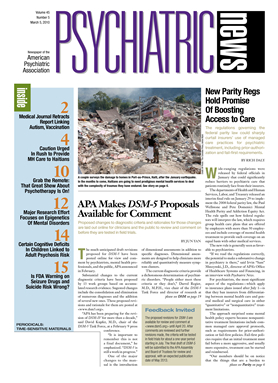Wide-ranging regulations were released by federal officials in January that could significantly reduce barriers to psychiatric care that patients routinely face from their insurers.
The departments of Health and Human Services, Labor, and Treasury released an interim final rule on January 29 to implement the 2008 federal parity law, the Paul Wellstone and Pete Domenici Mental Health Parity and Addiction Equity Act. The rule spells out how federal regulators will interpret the law, which requires group health care plans that are offered by employers with more than 50 employees and include coverage of mental health treatment to provide such coverage on an equal basis with other medical services.
The new rule is generally seen as favorable to psychiatrists.
“If we read the regulations correctly, the potential to make a substantive change in psychiatry is there,” said Irvin “Sam” Muszynski, J.D., director of APA's Office of Healthcare Systems and Financing, in an interview with Psychiatric News.
For psychiatrists, the most significant aspect of the regulations—which apply to insurance plans issued after July 1—is that they ban insurers from differentiating between mental health care and general medical and surgical care in either “quantitative” or “nonquantitative” treatment limitations.
The approach surprised some mental health policy experts because nonquantitative treatment limitations include common managed care approval protocols, such as requirements for prior-authorization or fail-first policies. Fail-first policies require that an initial treatment must fail before a more aggressive, and usually more expensive, treatment can be started and reimbursed.
“Our members should be on notice that the things that are a burden to them—including undue prior-authorization requirements or low reimbursement rates—may be addressable under these rules,” Muszynski said.
APA President Alan Schatzberg, M.D., praised the “many positive aspects” of the new regulations, including the explicit requirement for a single deductible for mental health and medical/surgical coverage.
APA will obtain an in-depth legal analysis of the regulations by outside lawyers and consult with mental health advocates in Congress, employers, and other mental health groups before submitting formal comments, which are due May 3.
“Mental health parity was a major advance for APA and for our patients living with mental illnesses,” said Schatzberg in a written statement. “APA will continue to work hard and submit the important feedback to the administration that is necessary to make sure our patients receive the care they need.”
Another aspect of APA's response to the rules was the launch of a new Web site, <
www.mentalhealthparitywatch.org>, to help psychiatrists and their patients better understand the parity law, the implementation regulations, and their impact on practices and insurance benefits (see
How's Parity Working?). APA leaders urge psychiatrists to report any concerns with an insurer's implementation of the requirements through that Web site. Muszynski said that district branches also are being asked to help identify situations in which insurers appear noncompliant with the new law.
Here are other key features of the regulations—based on an initial APA analysis that still must be confirmed—that affect psychiatrists:
•.
A reversal of insurers' practice of excluding psychiatrists from so-called inflator clauses. These clauses increase reimbursement rates set by insurers by at least the annual rate of inflation.
•.
A requirement for insurers to justify cases in which psychiatrists are reimbursed much less than the average rate for most other physicians.
•.
A requirement that insurers allow retrospective reviews for psychiatric cases in which prior authorization was not obtained but the care was required as a “medical necessity” in policies that already allow such retrospective review for other medical care.
Federal regulators also may target prior-authorization requirements for outpatient psychiatric care in many insurance policies, because they often do not appear to be equivalent to what those policies require for other medical care they cover.
“That's a battle that's squarely in our sights now,” Muszynski said.
APA will host a series of Web seminars for its members that spell out the practical implications of the new regulations, but no dates have been set yet.
